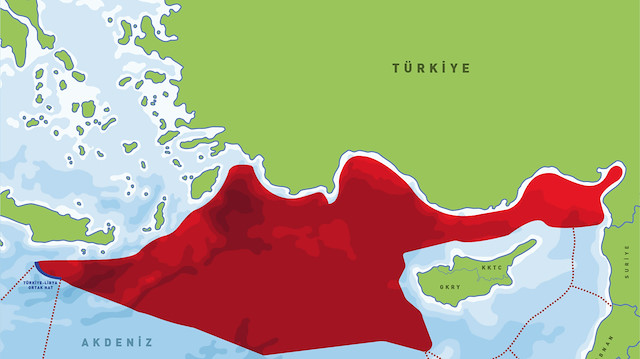

File photo
'It is obvious that after this agreement, serious steps will be taken against the Tripoli government both on the field and in the international arena,' says Middle East expert
Oil-rich Libya, which has been in a whirlwind of instability ever since Muammar Gaddafi was ousted in 2011, has now entered a critical period.
Turkey and Libya signed a memorandum of understanding on Nov. 27, which defines their maritime borders, opening a new chapter in the East Mediterranean. It carves out a slanting sea corridor of maritime boundaries at the closest points between Libya and Turkey, potentially clearing the way for oil and gas search there.
Speaking exclusively to Yeni Şafak daily, Middle East expert Gökhan Bozbaş evaluated the situation, noted that states of the anti-Turkey axis will increase support to eastern Libyan commander Khalifa Haftar in a bid to oust Ankara from the region.
“Looking at preliminary reactions to Turkey’s deal, we can see that states are spewing hatred. There is nothing questionable about the deal with Libya’s internationally-recognized government of Tripoli, however Greece’s reaction needs to be evaluated in its simplest form,” he said.

Greece lodged objections to the United Nations over the accord between Libya and Turkey as a violation of international law, a Greek government spokesman said on Tuesday.
Greece expelled the Libyan ambassador in response to the deal last week, infuriated at a pact which skirts the Greek island of Crete and infringes, in Athens's view, its continental shelf.
The memorandum asserts Turkey’s rights in the Eastern Mediterranean in the face of unilateral drilling by the Greek Cypriot administration, clarifying that the Turkish Republic of Northern Cyprus (TRNC) also has rights to the resources in the area.
“It is obvious that after this agreement, serious steps will be taken against the Tripoli government both on the field and in the international arena. Haftar will be supported on the ground and appeals will be made to organizations like the EU, UN and NATO to annul this accord,” Bozbaş added.
Conflicts to take Libya by storm
“Ever since 2010 regional balances have been shaky. The shifts that occurred in the wake of the Arab Spring were at first to Turkey’s advantage. However, especially with the coup attempt in Egypt, the Daesh terror group gaining strength and Haftar gaining ground in Libya’s civil war shifted the balances against Turkey. Hence, Turkey, with this deal, made a move to once again tip the scale in its favor. It is possible that this situation could fuel conflicts in Libya, because all national and international actors that oppose Turkey will toughen their stance against the Tripoli government due to it signing an agreement with Ankara,” Bozbaş said.
In April, Haftar’s forces launched a military campaign to capture Tripoli from the GNA but have so far failed to progress beyond the city’s outskirts.
Found to be tactically lacking against GNA forces, it was decided that Haftar’s fighters would secretly receive guerrilla warfare training from Israel with the aim of facilitating the capture of Tripoli.
According to UN data, over 1,000 people have been killed since the start of the operation and more than 5,000 injured.
Since the ouster of late leader Muammar Gaddafi in 2011, two seats of power have emerged in Libya: one in eastern Libya supported mainly by Egypt and the United Arab Emirates and another in Tripoli, which enjoys UN and international recognition.

How will Egypt react to Turkey’s deal with Libya?
“The Southern Cyprus administration, Egypt and Israel conducted the agreement that we made with Libya in the early 2000s; by dividing the Eastern Mediterranean into 13 parcels, they started gas explorations despite all our opposition. The deal we struck with Libya shapes the western border of the deal that these three states made. Egypt comes off worst, as Libya is Cairo’s biggest alternative on the transition route of the discovered gas. The best Egypt could do to counter-act Turkey’s move is to strike a similar deal with the Greek Cypriot administration.”
Libya’s neighbor Egypt dismissed the deal as “illegal” as did Cyprus, while Greece has said any such accord would be geographically absurd because it ignored the presence of the Greek island of Crete between the coasts of Turkey and Libya.
Haftar was unable to capture Tripoli following an assault launched back in April despite receiving support from the UAE, Saudi Arabia, Egypt and France, in addition to training for his forces from Israel.
#Libya
#Haftar
#Turkey
#Gaddafi





